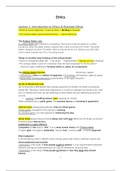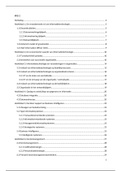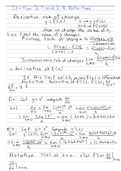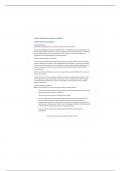Lecture 1. Introduction to Ethics & Business Ethics
• Ethics & moral judgments • Cases & ethics • Bluffing & business
• The antique dealer case & ethical theories • Moral dilemmas
The Antique Dealer case:
An antique dealer visits a farmer by coincidence. The farmer invites the dealer for a coffee.
During the coffee, the dealer notices a cabinet with a value of at least EUR 25,000. The farmer
doesn't recognize its value. The dealer offers to help the farmer & is willing to pay EUR 1000.
Is this a clever business man? Or is he acting wrong?
Things to consider when thinking of the antique dealer:
• Harm? Is everybody better off? • Fair price? • Rights/thefts? • Misuse of trust! Cheating?
• The antique dealer is part of a company: Does he have employees? Is he the owner?
Does the make a difference? Personal ethics vs. ethics of a corporation.
The antique dealer theories Moral duty, respect
• Utilitarianism: maximize welfare & happiness • Deontology: will/intention, rights & justice
• Virtue ethics /Communitarianism: characteristics of the agent/situation.
Jan Six & Rembrandt case:
Jan Six discovers a Rembrandt that is being auctioned at Christies. He seeks a cofinancier,
Sander Bijl. The price is lower than expected as it is sold as a replicate, but tends to be a real
one. A scientist prof Ernst van der Wetering involved. Bijl & Van der Wetering perceive Six
as a liar.
• Question: Is bluffing ethical? Carr: depends on context
Often compared with a poker game! The essential factors are knowing & agreement.
Sinek & Carse distinguished between finite & infinite games.
A finite game: is played for the purpose of winning
An infinitive game: is for the purpose of continuing the play
Simon Sinek argues that we should always start with why. Before we do things, we should
first think about why we do it.
Leadership is a game (Simon):
Companies do not exist to “win”, but to meet human needs with 5 focus points:
A higher goal Courageous leadership Mutual trust A worthy rival A flexible approach
Moral judgment
Is the process by which 1 defines what is wrong, good, bad, ethical, unethical, neutral, etc.
Moral judgements can be either:
• Normative: is the study of how people ought to behave. It is an argumentative discipline
aimed at sorting out what behaviours (or rules for behaviour) would be best.
• Descriptive: is the study of how people do behave & how they think they should
behave.
1
,Conflicting norms & value
Dilemmas Conflicting values/norms Necessity to act
Choice between two evils / good solutions Not black & white
Focus on values
1. Pluralistic perspective 多元主义
A pluralistic society is a diverse one, where the people in it believe all kinds of different
things & tolerate each other's beliefs even when they don't match their own. A pluralistic
approach to politics embraces many different philosophies, such as capitalism &
socialism.资本主义和社会主义。
- 指事物的发展,到了一个很丰富的境界,有多种理想观点和主张,同时也有多种分歧意见的总称
- 多元观是马克思主义的阶级观相对抗的。它不承认资本主义社会存在阶级和阶级对立,认为资本主义社会由
多元的社会群体和个人所构成。在多元化社会中,起决定作用的是社会成员对某些社会价值和规范的共同意
向,即所谓“广泛的社会合意”,而大众媒介无非是它的反映和表现。
- 反对自由主义如果是指点自由主义打击都很自由,每个人会受到集权政府通知。政府和社会团体共同分担。
对抗政府和获得利益。既不支持完全自由主义,也不支持集权主义。社会角度:大家,群体,人员都有等同
权利和价值。政治权利是由政府和群体组织来共同维护的
- 多元主义不是简单地承认社会的多元化,而是社会中的不同群体可以互相理解并积极沟通。多元主义不是让
一个群体忍受另外一个不同的群体,而是对彼此有更多的了解。
- 多元主义不是说同意所有的事情,更不是说要把自己的想法和意见藏在身后,而是要保持自己的 identity 和
想法,多和别人沟通并互相理解(就是我可以理解你,所以我不强迫你,但是我不会变成你,你和我不一样
还是不一样,大家还是可以一起共存)。
You can substantiate the ranking of values / norm
Formulate a choice (there is a need for action)
Moral dilemmas & identity
3 factors form Identity: -Individual -Organization -Society
About moral & ethics, No relativism
2.Relativism 相对主义: standards are subjective & culturally determined.
The belief that there's no absolute truth, only the truths that a particular individual or culture
happen to believe. If you believe in relativism, then you think different people can have
different views about what's moral & immoral. (虽然牺牲了胖子但是牺牲他救了其余的 5 人,所以也不
一定把他推下去就是错的)
- 是一种认为观点没有绝对的对与错,只有因立场不同、条件差异而相互对立的哲学学说。该学说主应用在涉
及道德准则的场合,因为在相对的思维模式下,价值观和伦理学只能发挥有限的作用。
- 相对主义有多种不同的形式,取决于争议的程度。相对主义的实质是:一个概念有确定的形象概念(即可以
用数字表示),但没有确定的抽象概念(即不能用确定的数字表示),那么此概念就是相对概念。像这样的
概念就没有绝对的对与错,只能根据抽象概念的大小来相对的判断对与错。值得注意的是,相对主义主张成
立的隐含前提建立在它绝对适用于所有事物上,既否定普遍有效真理的存在却又主张自己是普遍有效的真理。
- 在 moral 方面不应该允许相对主义
- 相对主义有强调了没有绝对的对错之分,它强调的是没有绝对的真理
3. (lecture 3) Absolutism 绝对专治主义 is a political system in which 1 ruler or leader
has complete power & authority over a country.是一種哲學上的價值理論,與相對主義對立。認為所
謂的真理和價值能客觀、絕對的永恆存在。且這種真理僅能由一種方法去描述。政治上的絕對主義則是指對一政治信
念的絕對效忠。信念是必须有规则,但不能有例外。它强调说世界上存在着绝对的普遍的道德准则,有明确的责任和权
利,任何行为只要是违背了这些原则,无论结果怎么样,就算其最终取得的结果是好的,也是不道德的。这一理论以康
德为代表人物。(把胖子推下去是把无辜的人牵扯进来了,尽管结果是好的但是把胖子牵扯进来就不对!)
- 绝对主义认为世间存在唯一标准,所有真理都是通过一个方法检验的。它认为所有事情只要过了那条线,那
就是不对的,不道德的。
- 绝对主义强调的是,唯一真理永远不变,并且这个真理或者道德适用于所有场景和社会。
2
,4. Subjectivism 主观主义 is the doctrine that "our own mental activity is the only
unquestionable fact of our experience.", instead of shared or communal, and that there is
no external or objective truth. 根据自己的意志行事,对外部环境的变化毫不理会,认为没有什么道理存在,道理
皆出自主观。在观察和处理问题时,不是从客观实际出发,而是从主观感情、愿望、意志出发,从狭隘的个人经验或本
本出发,采取孤立、静止、片面的观点,使主观和客观相分裂、认识和实践相脱离。(我认为某某很好,做什么都是正确的)
- 主观主义讲的是做任何事情都要依据自己的想法,也没有什么公共道德观念,完全依靠自己的意志行事,不
理会外部世界。主观主义的出发点就是自身的主观情感,个人意愿,而非从客观出发
- 主观主义强调的是一个人的行事方法都是从主观出发,完全不管客观事实
这两个主义容易混淆是因为它们都忽视了事物的客观规律,都忽略了事物会变化这个事实。但是两个主义的强调点不
一样。
Pitfalls in moral judgement
• Relativism •Standards are subjective & culturally determined
• Confusion of law & ethics • Ethics yield money ?
• An enterprise has different obligations than natural persons 企业与个人 take 的责任很不一样
• Shifting responsibility:
Different roles have different responsibilities, people play diverse roles in their life
• Misunderstanding an affective relationship as a contract 将情感关系误解为契约
• 5.Paternalism 家长式主义: Restricting the freedom & responsibilities of those
subordinate. 限制下属的自由和责任 Is the interference of a state or an individual with another
person, against their will & defended or motivated by a claim that the person interfered
with will be better off or protected from harm。由个人、组织、或国家,圖以替一些人或群体的好處設
想,去限制人或群体的自由或自主权。家长作风也可以意味着该行为是对抗或忽视一个人的意志,或者该行为表现出
优越感的态度。
• 6.Objectivism 客观主义 (Ayn Rand): the belief that certain things, especially moral
truths, exist independently of human knowledge or perception of them. It holds that
there is no greater moral goal than achieving happiness. But one cannot achieve happiness
by wish or whim. Fundamentally, it requires rational respect for the facts of reality, including
the facts about our human nature & need. 认为世界是实在的,有结构的,而这种结构是可以被认识的,
因此存在着关于客观世界的可靠知识。 知识是客观存在的真理,这些真理通过自然现象和社会现象而表现出来。根据
外部环境的变化适当调整自己的位置(变色龙)。客观主义是根据外部环境的变化适当调整自己的位置。(客观主义认
为一切道理存在于客体或物体(包括人类和社会的秩序),常常喜欢把自己的主观理解说成客观的道理
7.Rational individualism 理性个人主义
个人有权力只为自己而活,不需要为了他人的利益而牺牲自己,也不会强迫别人为了自己而做出牺牲。人也不会强迫
给别人灌输自己的观念。同时人们必将有足够的理性来选择自己的价值观和行为准则。
3
,Chapter 1 Doing the Right thing
There are 3 different ways of thinking about justice (i.e. ways to approach the distribution
of goods): 1. Maximizing welfare 2. Respecting freedom 3. Promoting virtue
The standard case for unfettered markets rests on 2 claims:
1. Markets promote the welfare of society as a whole by providing incentives for people
to work hard supplying the goods that other people want.
2. Markets respect individual freedom; rather than impose a certain value on goods &
services, markets let people choose for themselves what value to place on the things
they exchange.
The virtue argument:
"Greed is a vice, a bad way of being, especially when it makes people oblivious to the
suffering of others. More than a personal vice, it is at odds with civic virtue. Excessive
greed is a vice that a good society should discourage if it can."
It is not always simply about welfare & freedom. It is also about virtue - about cultivating
the attitudes & dispositions, the qualities of character, on which a good society depends.
One of the greatest questions of political philosophy: Does a just society seek to promote
the virtue of its citizens?
Aristotle teaches that justice means giving people what they deserve. And in order to
determine who deserve what, we have to determine what virtues are worthy of honour &
reward. We can't figure out what just constitution is without first reflecting the most
desirable way of life. For him, law can't be neutral on questions of the good life.
Modern philosophers argue that the principles of justice that define our rights should not
rest on any particular conception of virtue, or of the best way to live. Instead, a just
society respects each person's freedom to choose his or her own conception of the good
life.
Most of our arguments are about promoting prosperity & respecting individual freedom, on
the surface. But underlying these arguments, we can glimpse another set of convictions
about what virtues are worthy of honour & reward, and what way of life a good society
should promote.
To ask whether a society is just is to ask how it distributes the things we prize -income
& wealth, duties & rights, powers & opportunities, offices & honours. A just society
distributes these goods in the right way; it gives each person his or her due. The hard
questions begin when we ask what people are due & why.
Moral reflection consists in seeking a fit between judgments we make & the principles we
affirm.
Plato's point is that to grasp the meaning of justice & the nature of the good life, we
must rise above the prejudices & routines of everyday life.
4
, Lecture 2 Smith & the Rise of the Modern ‘Good Economy'.亚当
斯密 Adam Smith&马克思,三种意识形态
3 experiments:
1. The moral effects of markets
In the experiment, subjects decide between either saving the life of a mouse or receive money.
We compare individual decisions to those made in a bilateral & a multilateral market. People
who participate in markets by buying such goods often seem to act against their own moral
standards. Healthy mice were killed for money, which showed that there was 30% higher
preparedness in market conditions.
2. Economics-students
A central finding of experiments involving monetary allocation decisions is that substantial
numbers of people do not behave according to the predictions of game theory. This “free riding”
is what game theory predicts for participants whose goal is to maximize payment. It involved the
prisoner's dilemma by assessing the percentage of economics-students-others: defectors vs.
cooperators. 60% of economics students were defectors vs. 40% others defectors.
3. Bankers
The experiment used a game similar to one they employed in a previous study on inmates in a
maximum security prison. In this new experiment, 128 subjects were employees from a “large
international bank” whose identity the scientists would not disclose. It involved throwing a dice
and then reporting for money honest reporting, through bankers vs. non-bankers.
The big conflict is how ethical the moral market is?
Adam Smith & Karl Marx both wrote about capitalism, or an economic system in which
industry is controlled largely by private companies meant to generate profits. However,
they came to very different conclusions about how the economy & society function.
Adam Smith argues that the most efficient type of economy is one in which individual
producers produce as much as they want and then charge consumers any price they
see fit. Adam Smith's rationale for this is the concept of the invisible hand. We can think of
the invisible hand as a mechanism that regulates the economy without intervention; the
idea is that this system will work because each person will try to maximize his or her own
benefit. In other words, he introduced the classical paradigm - which differs from
traditional ethics & is still alive & kicking. People have rational maximisation of
individual preferences.
Karl Marx believed in the labor theory of value to explain relative differences in market
prices. This theory stated that the value of a produced economic good can be measured
objectively by the average number of labor-hours required to produce it.根据工人数量和工时来定价
The revolutionary turn (Bernard de Mandeville): His most noteworthy & notorious work is
The Fable of the Bees, which triggered immense public criticism at the time. He proposed
that many of the actions commonly thought to be virtuous were, instead, self-interested
at their core & therefore vicious. He was a critic of moral systems that claimed humans
had natural feelings of benevolence toward one another & he instead focused attention
on self-interested passions like pride & vanity that led to apparent acts of benevolence.
5













